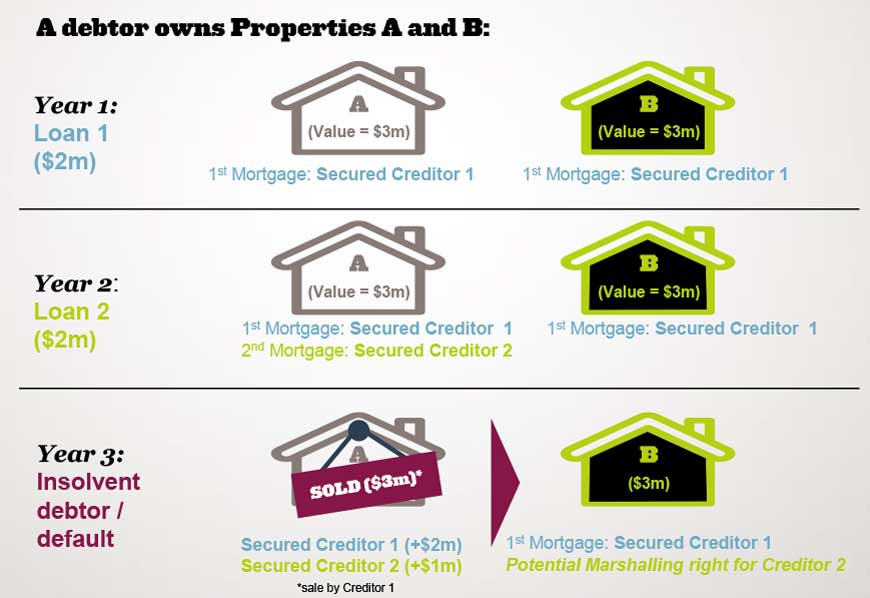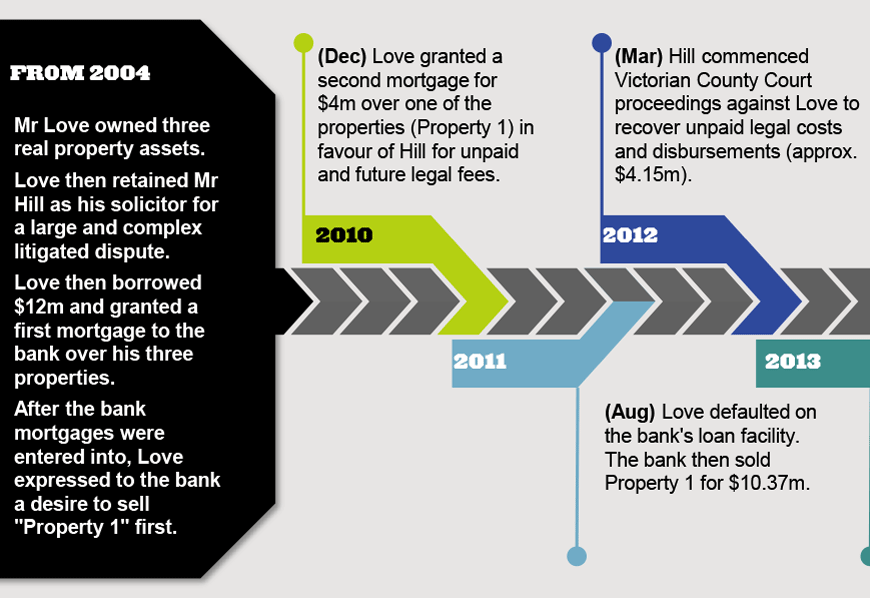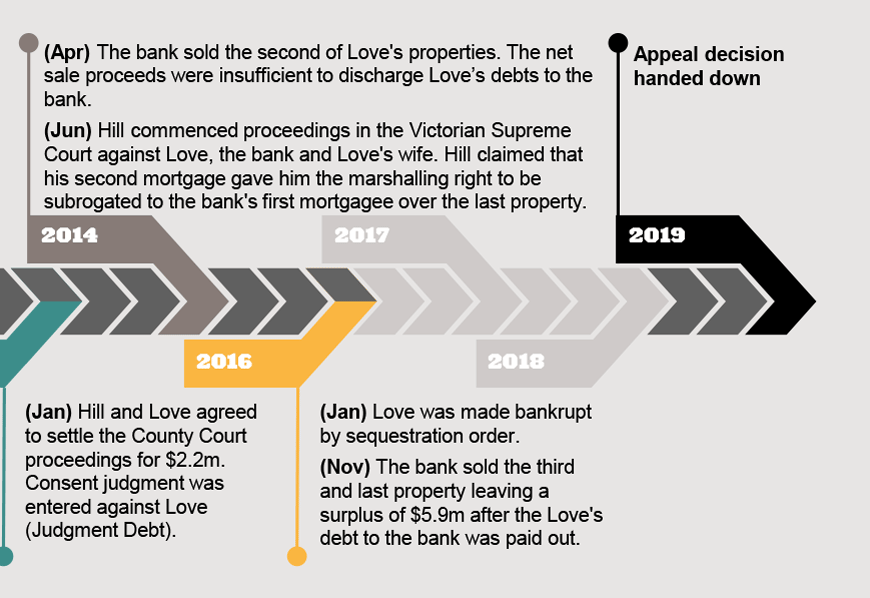
Marshalling the troops when debtors become insolvent: A refresher on the equitable doctrine of marshalling

Marshalling is a neglected tool in the insolvency toolbox, but it can play an important role in protecting the security interests of subordinate secured creditors.
The most common instance where marshalling can apply is in the context of second ranking mortgagees with security over one property in a group of properties, owned by an insolvent debtor, where that property and the balance of other properties are subject to first-ranking securities of a separate mortgagee. Marshalling can also apply to other forms of security, including charges and liens, and in the administration of deceased estates.

Marshalling in an insolvency context
In Figure 1 above, first-ranking Secured Creditor 1 had the choice to realise Property B first, which would have preserved Secured Creditor 2's security over Property A. Instead, Secured Creditor 1 elected to exercise its power of sale in respect of Property A, causing Secured Creditor 2 to lose their security interest at common law / under statute.
Marshalling is where equity steps in to prevent the harm suffered by Secured Creditor 2 at the hands of Secured Creditor 1, which will ordinarily take place where the debtor defaults on its obligations to Secured Creditor 2 under Loan 2. Therefore, from a practical perspective, marshalling only really has an impact when the debtor is, or becomes, insolvent. Equity allows Secured Creditor 2 to be subrogated to (i.e. stand in the shoes of Secured Creditor 1) Secured Creditor 1's mortgage over Property B to enforce the debt.
When can a secured creditor marshal?
The ways in which the doctrine of marshalling can potentially apply are by no means settled in Australia. However, there are some identifiable factors which can affect a subordinate secured creditor's right to marshal. If we go back to the scenario above:
- there must be a common debtor (sometimes referred to as "the common debtor rule"). However, it is possible that a secured creditor can marshal against a second debtor's assets where the first debtor has the ability to compel the second to pay the debt;
- Secured Creditor 2 cannot use their right to marshal to force Secured Creditor 1 to sell Property B first;
- a binding arrangement (arising under statute, common law or equity) between Secured Creditor 1 and the debtor to sell Property A first will deny Secured Creditor 2's right to marshal;
- there must be a secured debt owing to Secured Creditor 2 at the time Secured Creditor 1 sells Property A;
- the value that Secured Creditor 2 can recover by marshalling is not limited to the value of the debt that existed at the time Property A was sold. It may extend to the quantum of the debt at the time the marshalling right is exercised in respect of Property B;
- given marshalling is an equitable concept, it will not be permitted where, for example, it would negatively affect the rights of a third party;
There is doubt as to whether marshalling creates an equitable proprietary interest in the property the subject of the security – or example, marshalling would probably not deem Secured Creditor 1 to hold the proceeds of sale of Property B on trust for Secured Creditor 2.
A recent case study of marshalling in action: Burness v Hill [2019] VSCA 94
Marshalling cases are not that common in the courts, but when they do arise they can give very useful guidance on how marshalling can work. The decision in Burness is particularly useful, as it not only goes through the principles, but also provides insight into the effect of the subordinate secured creditor entering insolvency and the role of the Trustee in Bankruptcy's role.
The story starts in 2004 with a man, Mr Love, who needed to pay his legal fees:
At trial, the Trustee argued (among other things) that:
- there was no secured debt when Property 1 was sold, because:
- the Judgment Debt did not exist at this time and was therefore not secured by Hill's second mortgage; and
- Hill's claim for unpaid legal fees and disbursements had been extinguished, and therefore could not form the basis of a marshalling claim;
- Love and the bank had an arrangement to sell the doubly secured property first; and
- Hill released his right to marshal under the settlement terms agreed between Hill and Love in the County Court proceeding.
Justice Sifris rejected each of these arguments in upholding Hill's marshalling right, and therefore the right to access the surplus funds from the sale of the third property. The Court of Appeal agreed, finding that:
- the debt owed to Hill was still a secured debt when Property 1 was sold;
- the arrangement between Love and the bank to sell Property 1 was non-binding, and therefore, did not deprive Hill of his marshalling right; and
- after applying the common law and (little known) equitable principles of interpretation to the terms of the settlement deed, Hill had not released his marshalling right in settling the County Court proceeding.
Three practical actions for subordinate creditors who want the option to marshal
The decision in Burness is of particular importance to prospective subordinate creditors, because such creditors may want to make inquiries as to whether there are any binding arrangements between the debtor and the first ranking secured creditor (including priority deeds), which would affect their right to marshal in the event the debtor becomes insolvent.
Secondly, in settling proceedings to enable a debt to be enforced, subordinate creditors should be careful not to cast the terms of the release too broadly such that the release amounts to a waiver of the right to marshal in the event of the debtor insolvency.
Finally, when entering a transaction involving the transfer of debts and associated securities the transferee should consider whether terms of that transaction refer to a secured creditor’s right to marshal – and if they don't, whether they should.
Get in touch


